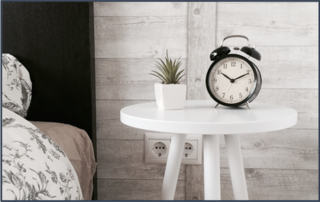Bipolar Disorder
Coping With Lockdown and Bipolar Disorder
Tips for daily routines, sleep, and staying hopeful during COVID-19.
Posted April 30, 2020 Reviewed by Matt Huston

Governments around the world have instituted social distancing and social isolation measures to curb the spread of the COVID-19 virus. This has led many people to experience changes in their normal daily routines of work, study, and other lifestyle activities. Spending more time at home can generate many challenges—increased tension with housemates, loneliness, less distraction, and maybe more rumination—but one challenge is particularly relevant to people with bipolar disorders. Here are some expert tips from the International Society for Bipolar Disorders Chronobiology Task Force.
The body's internal clock, and the need for strong daily routines
One of the most important brain systems contributing to wellbeing is the body’s internal biological clock (the circadian system). This system keeps our body and our behavior synchronized with the 24-hour cycle of light and dark. Predictable daily schedules and regular routines help to keep the body clock running smoothly. When it runs run smoothly, we feel better. Research shows that disrupted body clocks are associated with bipolar disorder, but also other conditions including depression, diabetes, obesity, and cancer.
When faced with major upheavals in our lives—such as those resulting from COVID-19—our body clocks have much more difficulty re-establishing regular biological rhythms. Without the normal social routines of work, study, and socializing, the biological clock system may be confused or challenged. As a result, we may experience negative physical symptoms similar to jet lag, such as disturbed sleep, appetite, energy, and mood.
If you have a mood disorder such as depression or bipolar disorder, research suggests that you have a sensitive body clock. Your body clock is more prone to losing track of time when the environment is disturbed, and a disrupted body clock may lead to mood episodes. Paying attention to routines may be especially important during times of stress to keep your body clock regular and your mood stable.
Helping your body clock to stay on track during major life disruptions such as the COVID-19 pandemic may help you feel better. Here are some easy tips for improving the regularity of your daily routines, even when nothing about your life feels regular.
Self-management strategies for increasing regularity
- Set up a routine for yourself while you are in quarantine or working from home; routines help stabilize body clocks.
- Get up at the same time every day: a regular wake time is the most important input for stabilizing your body clock.
- Make sure you spend some time outdoors every day, especially in the early morning; your body clock is regulated by the light-dark cycle.
- If you can’t go outside, try to spend at least two hours by a window, looking into the daylight, and focusing on being calm.
- Set times for a few regular activities each day such as home tutoring, telephone calls with a friend, or cooking; do these activities at the same time each day.
- Exercise every day, ideally at the same time each day.
- Eat meals at the same time every day; if you’re not hungry, at least eat a small snack.
- Social interactions are important, even during social distancing; seek out “back and forth” social interactions where you share thoughts and feelings with another person in real-time; videoconferencing, telephone, or real-time text-messaging is preferred to scrolling through messages. Schedule these interactions at the same time every day.
- Avoid naps during daylight hours, especially later in the day; if you must nap, restrict the nap to 30 minutes—napping can make it hard to fall asleep at night.
- Avoid bright light (especially blue light) in the evening (e.g., computer screens, smartphones); blue spectrum light suppresses the hormone that helps us sleep.
- Stick to consistent sleep and wake times that fit your natural rhythms. If you are a night owl, it’s OK to stay up a little bit later and get up a little bit later than others in the household, but make sure you go to sleep and get up at the same time every day.
Want to help us understand this better?
A group of clinical researchers from around the world (US, Canada, Denmark, Australia, UK, New Zealand) is conducting a scientific study of the impact of social isolation on mood and sleep among people with mood disorders. If you're interested in completing a brief (20-30) online survey about your experiences, please click here.
LinkedIn Image Credit: fizkes/Shutterstock


